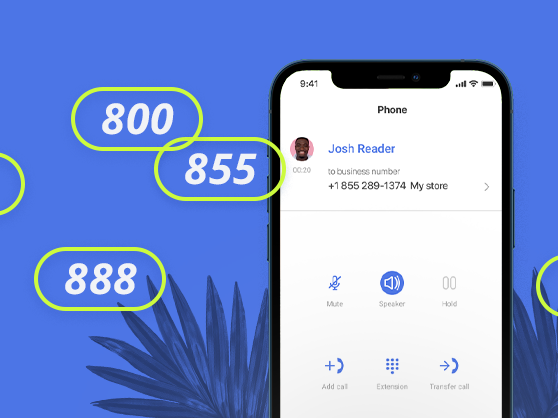If your company has decided to get a virtual phone number, one of the bigger choices you will initially make is going for a local number or a toll-free number. They both have their pros and cons, so knowing how your number will influence your business is paramount. Here we give a quick breakdown on how to make the right decision for your business.
- The Pros of a Toll-Free Number
- The Pros of a Local Number
- The Cons of a Local Number
- The Cons of a Toll-Free Number
- Making a Decision
The Pros of a Toll-Free Number
People who choose toll-free numbers for their business are in the minority, but it’s good to know what kinds of businesses opt for them. Naturally, these businesses have customer bases spread out across the country (or the globe). In some cases, the business may have a supplier or partner whom they regularly communicate with located far away.
For both of these cases, perhaps the biggest advantage of a toll-free number is that those long-distance calls are cheaper for you and carry no extra charge for callers – giving your business a national presence. Frankly. there is no substitute for looking reliable as a business, and a national presence will do just that.
The accessibility of toll-free numbers is also highly appealing for some people. For customers, being able to call for free, no matter where they are, is obviously a huge plus. For you, that means no one will be scared off from calling if they’re in a different area code.
Likewise, if your business’s needs adapt or if you need to change locations, there won’t be any hassle about changing numbers. Toll-free numbers are incredibly stable.
The other situation where toll-free numbers tend to benefit a business is for online shops. An online shop can’t directly control who browses their site, so playing it safe and getting a national number usually covers the bases, especially for advertising material.
The Pros of a Local Number
Most of the good derived from a business having a local number are actually counters to the problems that come with a toll-free number. To put things simply however, the biggest benefit of a local business number is the accessibility to your customer base. If your business is not normally dealing with clients around the country or across state lines, a local number is likely the way to go.
One of the main reasons for this is trust.
According to a survey by SinglePlatform, 86% of consumers consider local businesses a better alternative to national/international companies in terms of quality. While respondents believe that national chains offer more competitive pricing, 72% of participants find it acceptable to pay more to local companies if they provide better quality. What’s more, 79% believe that local businesses are more reliable. Perhaps it’s a different kind of reliability, but the trust and comfort of dealing with local business can’t be beat.
This makes sense, since most local companies are small businesses, meaning that each customer plays a crucial role in its existence. When people speak about “customer relationships,” it’s in this context. You don’t have a relationship with Nike or Amazon because you don’t matter to them. With your local deli or photography studio though, your experience with them is everything.
The willingness to answer the phone also resonates here.
Most people will pick up for a number in their area code. After time, a local number may even become part of a community, a number everything knows or has in their phone.
The Cons of a Local Number
If we’re picking apart the idea of a local number, there isn’t much ammunition.
For small businesses, local numbers typically accomplish everything a number can achieve. The only black mark against it is the lack of national reach, which, if your company grows or changes its market, might lead to some logistical headaches.
The Cons of a Toll-Free Number
This, the downsides of having a national presence, is where the decision becomes clear for most. To reiterate, if your company has business around the country, toll-free numbers will absolutely help you. However, if your company does not have business in multiple states, think long and hard before getting a toll-free number. Here’s 3 big reasons why:
- People know long-distance calls are expensive, so they often don’t call much. That means that you might not save as much as you think you will.
- With modern technology like Skype and even MightyCall’s webphone (which uses voice-over IP through a WIFI connection), there are alternatives for long-distance calls
- Some people have negative associations with toll-free numbers, either connecting them with large, emotionally distance companies or telemarketers.
That last point is especially important. A Software Advice survey showed that 8 out of 10 respondents would be “extremely unlikely” to answer calls from unknown 800 numbers. If you’re not expecting a call from an 800 number, it can be seen as a red flag. Toll-free numbers just don’t inspire the level of trust that local numbers do.
Making a Decision
If your clientele is concentrated within a single area code or 2 bordering area codes, a local virtual phone number is likely to be the better option. Likewise, if you run an online shop that sells services or products that will likely resonate with specific people in a specific area, a local number is also the way to go.
When considering the differences between toll-free and local numbers, most come down to customer perception.
However, you get multiple phone numbers with every MightyCall plan, so if you’re having trouble deciding, you can always get one of each. The choice is yours.

Allow incoming calls to show your business number instead of the caller’s number to know it’s a business call
Choose a toll-free and local number for free
Set separate call routing rules for your business numbers
Port in your business number for free
Enable text messages and read texts on web & mobile
Enable call recordings for inbound & outbound calls




























